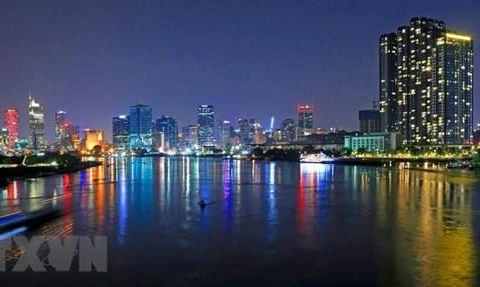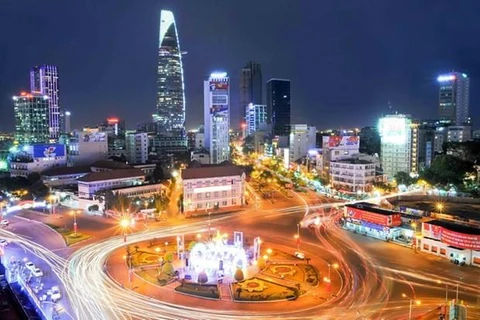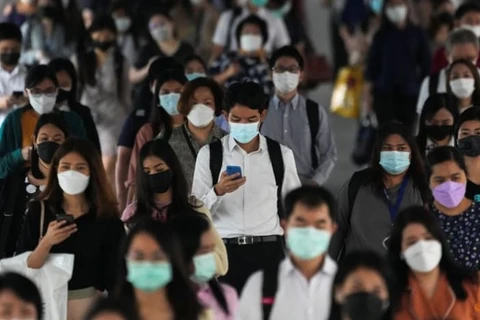1. Many countries shift to live safely with COVID-19
Variants of the virus SARS-CoV-2, especially Delta and Omicron, complicated the COVID-19 pandemic.
2. COP26 achieves numerous commitments on gas emission reduction
The 26th session of the Conference of the Parties to the UN Framework Convention on Climate Change (COP26), held in Glasgow of the United Kingdom, agreed to adopt the Glasgow Climate Pact, reaffirming its commitment to maintaining the goal of keeping global temperature rise at below 1.5 degrees Celsius.
 The opening ceremony of 26th session of the Conference of the Parties of the UN Framework Convention on Climate Change in Glasgow on October 31 (Photo: AFP/VNA)
The opening ceremony of 26th session of the Conference of the Parties of the UN Framework Convention on Climate Change in Glasgow on October 31 (Photo: AFP/VNA) 3. ASEAN strives to find solutions to regional stability and development
ASEAN reached a 5-point consensus on resolving the Myanmar situation, while agreeing to promote cooperation in response to COVID-19, step up economic recovery, and build the post-2025 ASEAN Community Vision.
 Prime Minister Pham Minh Chinh attends the 39th ASEAN Summit via videoconference on October 26, 2021 (Photo: VNA)
Prime Minister Pham Minh Chinh attends the 39th ASEAN Summit via videoconference on October 26, 2021 (Photo: VNA) 4. China declares achievement of moderately prosperous society
China marked the 100th anniversary of the founding of the Communist Party of China (CPC) (July 1, 1921 - 2021) by affirming the accomplishment of the goal of building a moderately prosperous society and the entry into a new stage of developing a modern socialist country that is prosperous, strong, democratic, culturally advanced, harmonious and beautiful by 2049.
5. US President Joe Biden changes many policies issued by his predecessor
With the policy of partnering with friends and learning more about rivals, President Joe Biden abandoned the principle of “America first”, changed or even reversed many of the policies adopted by his predecessor. Biden has re-engaged the US into many multilateral organisations and international agreements, cemented ties with traditional allies, and built alliances like AUKUS, a trilateral security pact between Australia, the United Kingdom and the United States, to maximise benefits and restore its international position.
Domestically, President Joe Biden signed an economic relief package named “America Rescue Plan” worth 1.9 trillion USD, proposed an infrastructure construction plan worth 2.3 trillion USD, promoted the approval of two bills on tightening gun control, and made some commitments on immigration.
6. Taliban returns to power in Afghanistan
On August 15, Taliban took control of Kabul capital and returned to power in Afghanistan after 20 years. Currently, the new Taliban government has not been recognised internationally, and the South Asian country is facing violent conflicts, a division between ethnic groups, terrorism threats, and a serious humanitarian crisis.
The international community has stepped up efforts to stabilise the situation in Afghanistan and prevent multinational terrorist activities in the context that the US officially completed a plan to withdraw all forces from Afghanistan on August 31 after 20 years of fighting.
7. German Chancellor Angela Merkel leaves office after 16 years
On October 26, German President Frank-Walter Steinmeier handed over the decision to end the term of Chancellor Angela Merkel. With four consecutive terms in office since 2005, Angela Merkel left her deep hallmarks as a powerful female politician who has helped lead Germany and the European Union (EU) to overcome difficult times related to the financial, public debt and migrant crises, with many achievements both at home and abroad.
 German President Frank-Walter Steinmeier (R) hands over the decision to end her term for Chancellor Angela Merkel (Photo: VNA)
German President Frank-Walter Steinmeier (R) hands over the decision to end her term for Chancellor Angela Merkel (Photo: VNA) 8. Energy crisis and global supply chain disruptions
Energy shortages and supply chain disruptions on a global scale have severely impacted the supply and distribution of numerous types of goods. The prices of oil, gas and coal skyrocketed, pushing up electricity prices, and leading to an escalation in consumer price index and inflation. Many businesses and factories had to close due to the shortage of electricity and production materials, thus negatively affecting the global economic recovery.
 A worker checks the gas pipeline system at a natural gas control centre in Hajduszoboszlo, more than 200km east of Budapest (Hungary) (Photo: AFP/VNA)
A worker checks the gas pipeline system at a natural gas control centre in Hajduszoboszlo, more than 200km east of Budapest (Hungary) (Photo: AFP/VNA) In March 2021, the supply chain through the Suez Canal was paralysed due to the incident of the super-heavy container ship Ever Given, which was stuck for nearly a week, causing about 400 million USD in damage per hour. The incident caused more than 400 other ships to be blocked, cutting off the circulation of about 15 percent of global sea freight at that time.
9. Imprints on space tourism and culture
The journey to explore the space made significant progress thanks to the great development of the private space tourism industry.
On July 20, US billionaire Jeff Bezos joined the first space exploration on the New Shepard spacecraft, developed and tested by his company Blue Origin. The youngest passenger on board this spacecraft was an 18-year-old Dutch student. Three months later, Blue Origin made a second flight carrying its oldest passenger, 90-year-old Canadian actor William Shatner.
 Blue Origin's New Shepard spacecraft departs West Texas in the US on October 13, 2021 (Photo: AFP/VNA)
Blue Origin's New Shepard spacecraft departs West Texas in the US on October 13, 2021 (Photo: AFP/VNA) In October, a Russian film crew spent 12 days on the International Space Station (ISS) shooting the first movie in orbit called “The Challenge”. Russian news agency TASS signed an agreement to open the first permanent representative office of a media agency on the ISS.
10. Many major international sport events resume
After the year-long postponement due to COVID-19, the Tokyo 2020 Summer Olympics and Paralympic Games were held in Japan from late July to early September. Meanwhile, June and July saw the UEFA Euro 2020 taking place in 11 European cities and the 2021 Copa América in Brazil.






























